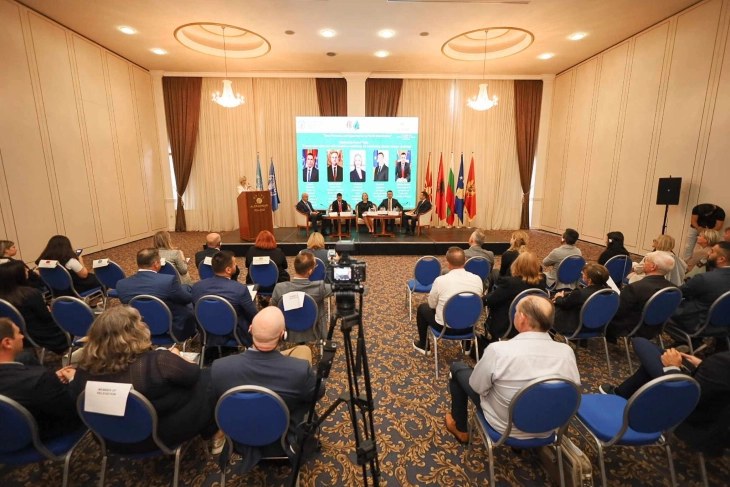Reforestation and afforestation essential in dealing with climate change challenges
- Reforestation and afforestation are essential in dealing with the challenges brought up with climate change. According to the latest 2021 statistics, North Macedonia's forest area occupies 1,049,000 hectares, with 63.4 percent being low and degraded forests in need of restoration. This was concluded at the first ministerial conference on forestry "Best Practices and Experiences in Forest Restoration" held on Friday in Skopje, with Minister of Agriculture, Forestry and Water Economy, Ljupcho Nikolovski, as host.

Skopje, 6 October 2023 (MIA) - Reforestation and afforestation are essential in dealing with the challenges brought up with climate change. According to the latest 2021 statistics, North Macedonia's forest area occupies 1,049,000 hectares, with 63.4 percent being low and degraded forests in need of restoration. This was concluded at the first ministerial conference on forestry "Best Practices and Experiences in Forest Restoration" held on Friday in Skopje, with Minister of Agriculture, Forestry and Water Economy, Ljupcho Nikolovski, as host.
Montenegro's Deputy Prime Minister and Minister of Agriculture, Forestry and Water Management, Vladimir Joković, Albania's Minister of Agriculture and Rural Development, Anila Denaj, Kosovo's Minister of Agriculture, Forestry and Rural Development, Faton Peci, and Bulgaria's Deputy Minister of Agriculture and Food, Miroslav Marinov, as well as many experts and professors in the country and the region also attended the conference.
Deputy PM for Economic Affairs Fatmir Bytyqi said in his opening speech that forests are not only a national treasure, but also a regional treasure for current and future generations. North Macedonia's EU accession process includes aligning national policies, strategies and legislation with EU strategies and the EU acquis related to forests and forestry. Because of the diverse importance of forests, they are included in several national strategic documents, among them being the 2021 National Strategy for Agriculture and Rural Development, which also provides opportunities for financial support to measures related to forestry in the context of rural development.

"The Government’s goal is to increase is to increase the forestry sector’s contributions to the national economy and rural development though sustainable forest management, providing renewable resources and protection of local and global environments, thus improve the quality of live for all citizens," Bytyqi stressed.
Minister Nikolovski said that the goal of the conference is to jointly strengthen the role of the forestry sector, as well as its contributions to the national economy through improved monitoring, planned reforestation and rural development.
"The Ministry of Agriculture, Forestry and Water Economy and the Government have set the green transition, preservation and forest development among the key priorities. We are committed to promoting the preservation of forests in North Macedonia, the development of rural environments and environmental protection," Nikolovski said.

Deputy Regional Representative of the Food and Agriculture Organization of the United Nations (FAO), Nabil Gangi, highlighted commitment to supporting North Macedonia's Government, as well as all other stakeholders and partners, in the cooperation to jointly improve the national capacities of the forestry sector.
"As we face the effects of climate change, forest fires and forest degradation, North Macedonia, the wider region, and other countries in the world find themselves in an urgent need to strengthen their reforestation capacities. We have seen wildfires burn in horrific scales in Canada, Turkey, Algeria and France, which means that all countries need to strengthen their national capacities to be able to deal with wildfires, and respond to the needs of their communities and citizens," Gangi said.
Vice-Dean at the Faculty of Forest Sciences, Landscape Architecture and Environmental Engineering, Makedonka Stojanovska, pointed out that the topic of forests and forestry and their importance has never been highlighted on such a political level. In addition to the traditional approach, she emphasized the importance of the modern, holistic approach that sees all benefits of forests.
"Significant funds are being allocated from government budgets, multilateral agencies and philanthropic organizations, to improve the quality of forests, have larger forest areas, and improve the environment in which we live in," Stojanovska said.
A ministerial roundtable meeting was also held as part of the conference, discussing restoration and afforestation as strategies for dealing with the challenges of climate change in the region.
The conference is organized by the Ministry of Agriculture, Forestry and Water Economy, the Food and Agriculture Organization of the United Nations (FAO) and Hans Em Faculty of Forest Sciences, Landscape Architecture and Environmental Engineering. ssh/nn/
Photo: MIA / Ministry of Agriculture, Forestry and Water Economy







